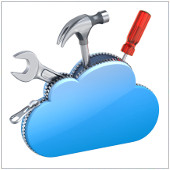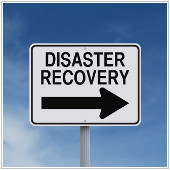 Where you store your company’s data backups is vital to the success of your business continuity strategy. There are various storage media to choose from, but if you value flexibility and convenience, then you should look no further than cloud storage. Here are the benefits that the cloud offers.
Where you store your company’s data backups is vital to the success of your business continuity strategy. There are various storage media to choose from, but if you value flexibility and convenience, then you should look no further than cloud storage. Here are the benefits that the cloud offers.
Improved uptime
Many business owners think it’s enough to store copies of their files either on an external hard drive or a separate computer housed within their office. Unfortunately, this tactic can go wrong in so many ways. First, it’s possible for bad actors to steal these devices and obtain the data they contain. Second, these devices are susceptible to damage caused by local disasters, cyberattacks, and errors committed by staff. If any of these were to happen, the business would lose access to its backups and might suffer downtime.
In contrast, cloud-hosted backups are always readily accessible with an internet-connected device. Cloud servers are located off-site, so they are not vulnerable to natural disasters in your immediate locale. What’s more, cloud service providers (CSPs) are obligated to keep their servers operational at all times. They make this possible by implementing top-grade cybersecurity measures and various redundancies, such as alternate servers and power supply systems.
Fast resource provisioning
During the backup creation process, spikes in user activity and resource usage can slow down websites and applications running in the background. A CSP can help you address this issue by monitoring user activities, enabling them to see spikes before or as they happen. The provider can then provision resources and virtual machines as needed to manage the influx of users.
Control over backup frequency
Since your employees could work on files and update information throughout the day, you must back up your files as frequently as necessary. Doing so ensures that you have the latest copies of your files even after a sudden outage.
With the cloud, you no longer have to worry about the frequency of your backups. CSPs offer round-the-clock and other fixed backup frequencies, as well as custom backup schedules tailored to your business’s unique requirements. Some services can even create backups as you perform changes on your files, ensuring up-to-date information at any time.
Support for flexible work setups
With flexible working arrangements becoming more and more popular, it’s now even more imperative for your business to invest in the cloud for backup storage. External hard disks, flash drives, and other offline storage media are accessible only to employees working in the office. During events that prevent workers from going to the office, such as the COVID-19 pandemic, depending on offline backups could result in your business ceasing operations altogether.
Cloud storage is accessible anywhere and anytime. This means that no matter where they choose to work, your staff will be able to access the files they need and remain productive as long as they have an internet connection.
Businesses around the world are leveraging the power of the cloud not just to ensure their continued operations but also to support their growth. If you’re looking for a managed cloud backup service to protect your business data, give us a call today to see how we can help.

 Having a business continuity plan ensures that you have constant access to your business’s data, even when a disaster strikes your locale. Understandably, your choice of backup storage media will be critical to the success of such a plan. In this blog, we’ll discuss why the cloud is the ideal place to keep your company’s data backups.
Having a business continuity plan ensures that you have constant access to your business’s data, even when a disaster strikes your locale. Understandably, your choice of backup storage media will be critical to the success of such a plan. In this blog, we’ll discuss why the cloud is the ideal place to keep your company’s data backups. There are several ways to ensure business continuity, and storing your company’s data in the cloud is undoubtedly one of the best. In this post, we’ll discuss the advantages of cloud storage over other backup media and why your company should invest in it.
There are several ways to ensure business continuity, and storing your company’s data in the cloud is undoubtedly one of the best. In this post, we’ll discuss the advantages of cloud storage over other backup media and why your company should invest in it. More and more healthcare organizations are turning to managed IT services providers (MSPs) for their IT needs. Outsourcing their IT functions enables hospitals and clinics to focus on being healthcare providers rather than IT professionals. Here are some of the best benefits of hiring one:
More and more healthcare organizations are turning to managed IT services providers (MSPs) for their IT needs. Outsourcing their IT functions enables hospitals and clinics to focus on being healthcare providers rather than IT professionals. Here are some of the best benefits of hiring one: The healthcare industry is relying on tech more than ever. Between implementing telemedicine, adopting data management best practices, and juggling countless other recent tech developments, managing business IT is a complex task, and so is best done by a managed IT services provider (MSP). Let’s explore the benefits of partnering with one:
The healthcare industry is relying on tech more than ever. Between implementing telemedicine, adopting data management best practices, and juggling countless other recent tech developments, managing business IT is a complex task, and so is best done by a managed IT services provider (MSP). Let’s explore the benefits of partnering with one: New technology is the heartbeat of modern medicine, which means hospitals spend more every year on IT to accommodate it. Whether your practice is struggling with integrating innovations or managing technologies, managed IT services providers (MSPs) are an ideal IT support option. Here’s why.
New technology is the heartbeat of modern medicine, which means hospitals spend more every year on IT to accommodate it. Whether your practice is struggling with integrating innovations or managing technologies, managed IT services providers (MSPs) are an ideal IT support option. Here’s why. Power outages can happen anytime and for a number of reasons, including accidents and natural disasters such as fires and hurricanes. While there’s little your business can do to prevent a power outage, you can mitigate its impacts on your operations by deploying an uninterrupted power supply (UPS) for your computers and networking equipment.
Power outages can happen anytime and for a number of reasons, including accidents and natural disasters such as fires and hurricanes. While there’s little your business can do to prevent a power outage, you can mitigate its impacts on your operations by deploying an uninterrupted power supply (UPS) for your computers and networking equipment. An uninterrupted power supply (UPS) is an essential component of a business’s IT network. It ensures that networking equipment stays operational during power outages or failures. This allows you to stay online so you don’t suffer the productivity- and profit-draining impacts of a power outage, especially one that happens without warning. Learn more about UPS systems and why they’re invaluable to businesses of all sizes.
An uninterrupted power supply (UPS) is an essential component of a business’s IT network. It ensures that networking equipment stays operational during power outages or failures. This allows you to stay online so you don’t suffer the productivity- and profit-draining impacts of a power outage, especially one that happens without warning. Learn more about UPS systems and why they’re invaluable to businesses of all sizes. Power outages are a major inconvenience to businesses. Even a few hours without electricity can lead to thousands of dollars in lost productivity and revenue. Fortunately, there’s something businesses like yours can do to reduce the effects of power outages, and that’s using an uninterrupted power supply (UPS) for your computers and networking equipment. Read on to learn more about the benefits of using a UPS for your network hardware.
Power outages are a major inconvenience to businesses. Even a few hours without electricity can lead to thousands of dollars in lost productivity and revenue. Fortunately, there’s something businesses like yours can do to reduce the effects of power outages, and that’s using an uninterrupted power supply (UPS) for your computers and networking equipment. Read on to learn more about the benefits of using a UPS for your network hardware. With advancements in cloud computing, disaster recovery (DR) has become more efficient and affordable than ever. However, many business owners still cling to some DR myths that can safely be disregarded, such as these three.
With advancements in cloud computing, disaster recovery (DR) has become more efficient and affordable than ever. However, many business owners still cling to some DR myths that can safely be disregarded, such as these three. Modern technology changes rapidly, but not all businesses can match its pace. When it comes to disaster recovery (DR), for instance, we see business owners clinging to ideas that no longer apply. It’s high time you learn the truth about the following DR myths so you can stop believing them.
Modern technology changes rapidly, but not all businesses can match its pace. When it comes to disaster recovery (DR), for instance, we see business owners clinging to ideas that no longer apply. It’s high time you learn the truth about the following DR myths so you can stop believing them. It is also a common practice to store another set of tape backups outside your premises to secure them in case a natural disaster befalls your office. However, if your storage spaces themselves are unsafe from natural disasters, this could pose a problem.
It is also a common practice to store another set of tape backups outside your premises to secure them in case a natural disaster befalls your office. However, if your storage spaces themselves are unsafe from natural disasters, this could pose a problem.